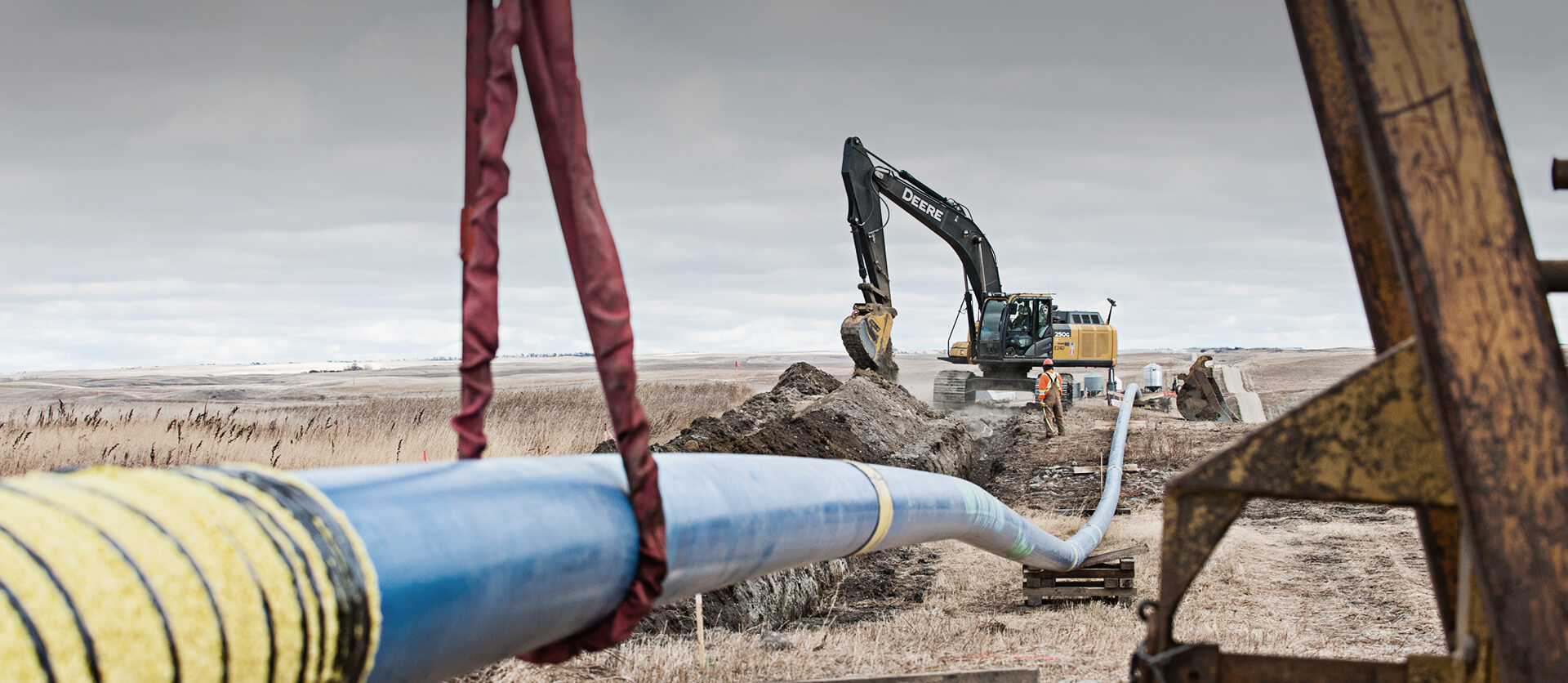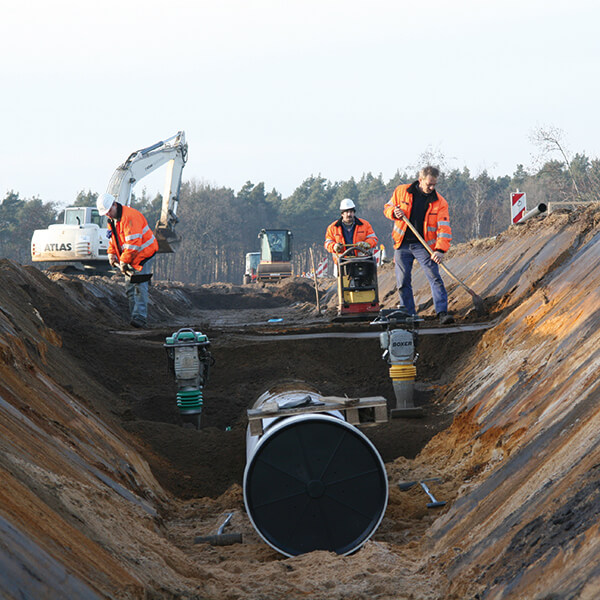Pipeline Construction Services FAQs: What Clients Need to Know
Wiki Article
The Vital Overview to Understanding Pipeline Construction Services and Their Significance
Pipeline Construction solutions are essential to the transportation of necessary sources such as water, gas, and oil. These services include careful planning and implementation, adhering to strict safety and security and environmental standards. As the industry adapts to modern challenges, comprehending its implications and elements ends up being significantly vital. What elements add to the growing significance of these solutions in today's economy? The complying with sections will certainly check out these essential aspects.Overview of Pipeline Construction Providers
Pipeline Construction solutions encompass a series of tasks important for the installment and upkeep of pipes utilized to carry numerous compounds, including gas, water, and oil. These solutions are vital for ensuring the safe and efficient activity of sources from one place to one more. The process generally starts with detailed preparation and design, which takes right into account regulative demands, ecological considerations, and logistical challenges.Once planning is total, excavation and grading of the land are conducted to prepare the site for Pipeline installation. This is adhered to by the real laying of the pipelines, which entails welding or signing up with sections together to create a constant flow course. After setup, rigorous screening is carried out to assure honesty and safety. Maintenance services are also supplied to deal with any problems that might develop with time. Generally, Pipeline Construction services play a crucial role in sustaining facilities for power and water circulation.
Trick Parts of Pipeline Construction
A successful Pipeline Construction task relies upon several essential components that ensure the secure and efficient setup of the Pipeline system. Detailed site analyses are critical, as they identify the geographical and ecological variables that may impact Construction. Next off, the option of proper materials, such as installations and pipelines, is vital for protecting resilience and compatibility with the delivered materials.Additionally, progressed Construction strategies, consisting of trenchless technology and directional exploration, boost effectiveness and minimize ecological effect. Effective job monitoring is an additional essential part, collaborating labor, equipment, and timelines to satisfy project objectives.
Additionally, communication amongst stakeholders, including designers, specialists, and regional authorities, assurances placement on task specifications and requirements. Comprehensive top quality control procedures throughout the Construction procedure ensure conformity with industry criteria and make the most of the Pipeline's operational lifespan. Collectively, these components form the backbone of a successful Pipeline Construction task.
Safety Specifications and Rules in Pipeline Construction

Improving Governing bodies, such as the Occupational Safety And Security and Health Management (OSHA) and the Pipeline and Hazardous Products Safety Management (PHMSA), stated details requirements that regulate Construction practices. These include methods for tools usage, worker training, and emergency action procedures. By carrying out these requirements, Construction business not only secure their workers yet additionally secure public trust. Ultimately, rigorous security procedures contribute to the long-lasting success of Pipeline jobs, ensuring they meet both functional and environmental assumptions.
Environmental Considerations in Pipeline Projects

Environmental considerations are indispensable to the preparation and execution of Pipeline jobs. These projects need to analyze potential effect on environments, water resources, and local wildlife. Performing complete ecological impact assessments (EIAs) is essential, enabling stakeholders to recognize and minimize threats prior to Construction begins.
Safeguarding sensitive locations, such as habitats and marshes, usually calls for implementing certain style functions or alternate directing to decrease interruption. In addition, Pipeline operators are entrusted with creating strategies for avoiding spills and leaks, which can have disastrous results on the setting.
Interaction with local communities is essential, as public issues can bring about project adjustments that improve ecological security. Compliance with laws set by ecological companies guarantees that tasks fulfill sustainability standards, fostering an equilibrium in between facilities needs and eco-friendly conservation. Inevitably, attending to environmental considerations not only safeguards nature but also advertises neighborhood trust and project stability.
The Role of Modern Technology in Pipeline Construction
Technology plays an important role in modern-day Pipeline Construction, improving effectiveness and precision. Advanced evaluating methods allow for specific planning and implementation, decreasing ecological effect and task delays. Furthermore, the integration of automation and robotics simplifies operations, lowering labor expenses and improving safety and security on Construction sites.Advanced Evaluating Methods
Advanced surveying methods play a necessary role in the effective execution of Pipeline Construction jobs. These approaches take advantage of advanced innovation to guarantee accurate mapping and evaluation of the surface where pipelines will certainly be installed. Methods such as Geographic Info Systems (GIS), LiDAR (Light Discovery and Ranging), and 3D modeling allow engineers to evaluate the landscape and visualize, determining prospective challenges and ecological issues. By making use of these advanced tools, teams can enhance accuracy in positioning and placement, greatly decreasing the danger of errors during Construction. In addition, real-time information collection permits for prompt adjustments and educated decision-making throughout the project lifecycle. Eventually, these checking advancements add to improved efficiency, safety and security, and sustainability in Pipeline Construction initiatives.Automation and Robotics

Economic Effect of Pipeline Infrastructure
Pipeline facilities plays a crucial function in moved here assisting in and shaping local economic climates profession. By supplying a reputable means of transporting oil, gas, and various other commodities, pipelines lower transportation costs and improve supply chain effectiveness. This framework draws in financial investment, boosts task development, and cultivates economic growth in bordering areas.The Construction and maintenance of pipes contribute significantly to regional economic situations, creating many employment chances in different fields, from engineering to labor. The influx of tasks frequently leads to boosted investing in neighborhood businesses, further boosting financial task.
In addition, pipes enhance energy safety by making sure a secure supply of sources, which is critical for industrial operations and domestic requirements. As areas end up being adjoined with Pipeline networks, they access to wider markets, raising competition and economic durability. Consequently, the economic impact of Pipeline infrastructure is complex, affecting both instant regional economies and more comprehensive regional growth.
Future Trends in Pipeline Construction Providers
The future of Pipeline Construction solutions is evolving in feedback to technological developments, regulatory adjustments, and expanding environmental considerations. Technologies such as drones read here and robotics are improving inspection and upkeep processes, boosting security and performance. Automation is poised to reduce labor prices and boost precision in Construction operations. In addition, the boosting focus on sustainability is triggering companies to embrace environmentally friendly products and practices, lining up with worldwide initiatives to lower carbon footprints.Governing structures are likewise adapting to address ecological impacts, pushing for greater openness and accountability in Pipeline projects. Additionally, the combination of smart innovations, consisting of real-time monitoring systems, is expected to enhance the integrity and efficiency of Pipeline networks. As energy demands shift toward sustainable resources, Pipeline Construction solutions will likely see a surge in jobs connected to biofuels and hydrogen transportation. Overall, these trends indicate a transformative period for the Pipeline Construction sector, concentrated on development and sustainability.
Often Asked Concerns
What Sorts of Pipelines Are Commonly Built?
Different kinds of pipelines are typically built, consisting of oil, sewer, water, and gas pipelines - Pipeline Construction Services. Each serves distinct purposes, helping with the transport of essential sources throughout areas while sticking to safety and ecological lawsJust how Lengthy Does a Normal Pipeline Task Take?
The period of a regular Pipeline job varies significantly, frequently ranging from a number of months to a few years. Factors affecting this timeline include project intricacy, regulatory authorizations, and ecological considerations that should be addressed.That Regulates Pipeline Construction Firms?
Pipeline Construction you could try here business are regulated by numerous government, state, and local agencies, including the Pipeline and Hazardous Products Safety And Security Management (PHMSA) and state public utility compensations, guaranteeing conformity with safety and ecological criteria throughout the Construction procedure.What Prevail Products Used in Pipeline Construction?
Usual materials used in Pipeline Construction consist of polyethylene, steel, and pvc. Each product provides distinctive advantages such as longevity, flexibility, and resistance to deterioration, making them appropriate for numerous applications in transporting gases and liquids.
How Are Pipeline Construction Prices Estimated?
Pipeline Construction expenses are approximated by assessing elements such as product expenses, labor prices, project complexity, environmental factors to consider, and regulatory needs (Pipeline Construction Services). Accurate expense estimation guarantees effective budgeting and project planning throughout the Construction procedurePipeline Construction solutions encompass a variety of tasks necessary for the installation and maintenance of pipelines made use of to carry numerous substances, including water, oil, and gas. An effective Pipeline Construction task relies on a number of vital parts that guarantee the safe and efficient setup of the Pipeline system. Advanced checking strategies play an essential role in the successful execution of Pipeline Construction jobs. Numerous kinds of pipes are generally created, including oil, sewer, gas, and water pipelines. Pipeline Construction prices are approximated by evaluating variables such as material expenses, labor rates, project complexity, environmental factors to consider, and regulatory requirements.
Report this wiki page